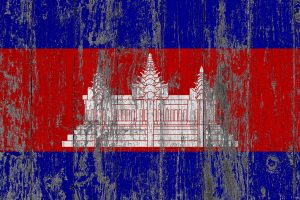A total of 17 political parties have registered to run in commune-level elections in June, an important bellwether for national polls in July 2023. The three-day registration period, which closed on Monday, saw tens of thousands of candidates register to compete for 11,622 council positions and the leadership of 1,652 communes.
Elections in the communes, the administrative division above village-level, are the most important local polls in Cambodia, as commune councilors periodically elect the members of district, provincial, and municipal councils, as well as most members of the Senate. Voice of Democracy (VOD), a local media outlet, has a good breakdown of the participating parties here.
To be sure, only one party of the 17 has a realistic chance: that is the ruling Cambodian People’s Party (CPP), led by Prime Minister Hun Sen, which has governed the country in various guises since 1979. It is the only party running candidates in every commune, and as VOD noted, “goes into the election with complete control over all but one commune in [the] country.”
Over the past five years (and to a certain for extent much longer), the CPP has also worked assiduously to prevent the emergence of any meaningful source of opposition. At the last commune election in June 2017, the Cambodia National Rescue Party (CNRP), a merger of two popular opposition parties, managed to win 43.8 percent of the popular vote, roughly the proportion that it won, to the CPP’s shock, at national elections in 2013.
The CPP response was ruthless: it arresting the party’s president Kem Sokha for treason, dissolved the party on similar grounds, and forced most of its senior leadership into exile, where the party’s former president, Sam Rainsy, had been living since late 2015. The result was predictable: the CPP contested the 2018 national election virtually unopposed, winning every seat in the National Assembly and returning Cambodia, in spirit if not in letter, to the one-party communist state that existed prior to 1989.
In this context, the participation of this host of minor parties in the commune election will function effectively as window-dressing or an acclamatory exercise designed to renew the CPP’s hold on the political grassroots. Indeed, small parties have already made allegations of threats, presumably on the part of ruling party officials, while the League for Democracy Party, a minor party that won around 5 percent of the popular vote at the 2018 national election, announced last week that it is boycotting the election, citing disagreements with the NEC over how to validate votes at polling places.
Is there any chance of the election veering off-script? Of the 17 parties, there is only a small handful that have any chance of challenging the well-resourced and -armed CPP, even in a hypothetically free and fair contest, and only one that is clearly opposed to the CPP. That is the Candlelight Party (CP), the latest incarnation of the Sam Rainsy Party, which merged with Kem Sokha’s Human Rights Party to form the CNRP in 2012.
The CP is well-positioned for a number of reasons. It is fielding the second-highest number of candidates in the election: 23,367 in 1,632 of the country’s 1,652 communes, according to the National Election Committee, or NEC; the party claims 1,649. This reflects the long-standing institutional capacity, however rudimentary, that the party has long possessed, first as the SRP (and its predecessor the Khmer Nation Party) and later as a primary faction of the CNRP. Indeed, the CP is explicitly positioning itself to capture the votes that once went to the CNRP, and in a free and fair election would stand a good chance of doing so.
Weighing against this is the controversial circumstances of the party’s reactivation late last year, a move that helped precipitate the collapse of the alliance between Sam Rainsy and Kem Sokha that undergirded the CNRP, and the sundering of their respective (and highly personalized) factions of the party. As a result, there has to be some question mark over whether the CP can successfully appeal to CNRP supporters who are more aligned with Kem Sokha, who is currently on trial and will not be participating in the commune election.
The next two largest parties are Funcinpec, a royalist bastion and former powerhouse of Cambodian politics that has since faded to near oblivion, and the Khmer National United Party, an offshoot of Funcinpec now led by the former general Nhek Bun Chhay, which currently holds the sole commune chief position not occupied by the CPP. If the flagging fortunes of the royalists over the past two decades are any indication, there is little chance of them winning much of the vote, despite fielding 9,055 and 8,078 candidates, respectively. Even if they do, these parties have long jettisoned any opposition tendencies: for years, their main interest has been to scrape together enough of the popular vote that they can leverage their senior officials sinecures within the CPP’s big tree of patronage.
As I noted last month, given the CPP’s near-total control of the levers of administrative power, the interest for outside observers in the upcoming electoral cycle is less about who wins than “the nature and extent of the rigging.” This then points to the primary question concerning the next national election, due in July 2023, of which the commune elections are often a good bellwether: namely, whether the trial of Kem Sokha, by far the most popular opposition politician remaining in Cambodia, will give way to a political settlement allowing him to participate in some form.

































